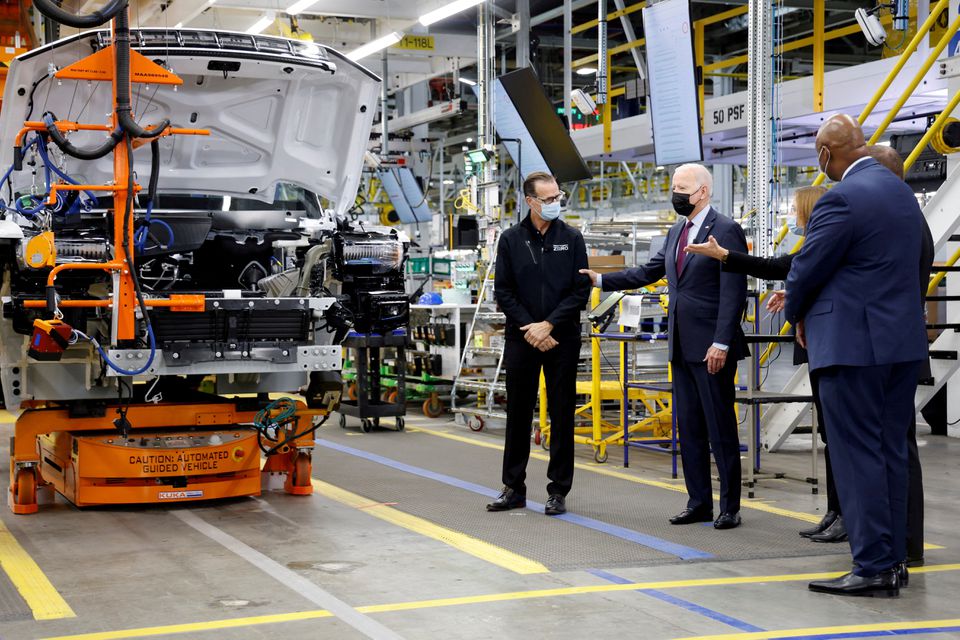DETROIT, Nov 17 (Reuters) – General Motors Co (GM.N) expects its electric vehicles will make money in 2025, with recently enacted federal subsidies plugging the profitability gap between EVs and GM’s combustion fleet, Chief Executive Mary Barra said Thursday.
Federal subsidies could add $3,500 to $5,500 a vehicle to pre-tax profits for GM electric vehicles, CFO Paul Jacobson said during a call ahead of a presentation to investors in New York. GM expects pre-tax profits for EVs could reach “low to mid-single digits” in 2025, not including federal subsidies from the Inflation Reduction Act.
With federal subsidies, GM’s electric vehicle fleet could approach profit margins comparable to combustion models, Barra and Jacobson said.
Jacobson also told investors that 2022 pre-tax profits will be between $13.5 billion and $14.5 billion, in the middle of a previous forecast range of $13 billion to $15 billion. The automaker raised its outlook for 2022 free cash flow to $10 billion to $11 billion, up 20% from the top end of the previous forecast.
That cash, generated from combustion models, will fund $11 billion to $13 billion in annual capital spending through 2025, GM said.
“Profits from these vehicles are literally funding our future,” GM President Mark Reuss told investors.
Barra has driven a long-running effort to convince investors that the Detroit automaker can be a growth company, reversing years of market share decline and retreat from unprofitable businesses.
So far, Wall Street has not gotten on board. GM shares trade at 6.5 times earnings, only slightly ahead of Detroit rival Ford Motor Co’s (F.N) multiple. EV leader Tesla (TSLA.O) trades at nearly 60 times earnings, even through its share price is down 47% for the year.
The automaker’s shares were down slightly as executives outlined the company’s strategy and showed investors images of future cars and trucks, including an electric large Cadillac SUV similar to the current Escalade.
GM pickup trucks and SUVs with internal combustion engines – referred to as “ICE” by industry executives – earn double-digit profit margins.
Barra said GM’s new electric vehicles could be profitable by 2025, and that federal subsidies offered by the Inflation Reduction Act could boost EV profit margins toward “ICE-like margins.”
GM is also accelerating EV production in China, the world’s largest market. By 2025, Barra said GM could produce up to 2 million electric vehicles globally.
GM’s profitability has lagged the benchmark set by Tesla. The electric vehicle company reported 17% pre-tax margins for the third quarter.
One way GM will try to narrow the profit gap is to use digital retailing and a revamped retail distribution system to cut $2,000 a vehicle from the costs of delivering vehicles to customers, Reuss told investors.
“Do not bet against this company,” Reuss told investors after outlining a lengthy list of new electric and combustion models planned for the next two years.
GM’s investments in domestic battery raw materials and cell production should make more of the Detroit automaker’s EVs eligible for federal subsidies, executives told investors.
GM announced a new deal with Brazilian miner Vale to secure nickel.
GM trails Tesla, Ford and Hyundai Motor Co (005380.KS) in U.S. EV sales this year. The company plans to accelerate EV production in North America and China from 2023 to 2025. From 2022 through the first half of 2024, GM said it will build 400,000 EVs for North America – a slower timetable than previously forecast.
GM forecast overall revenues will grow by 12% a year to more than $225 billion by 2025. That growth will be driven by new EV models, the expansion of the BrightDrop commercial vehicle business, software-driven revenues and the Cruise robo-taxi business, the company said.
BrightDrop projected $1 billion in annual revenues next year.











